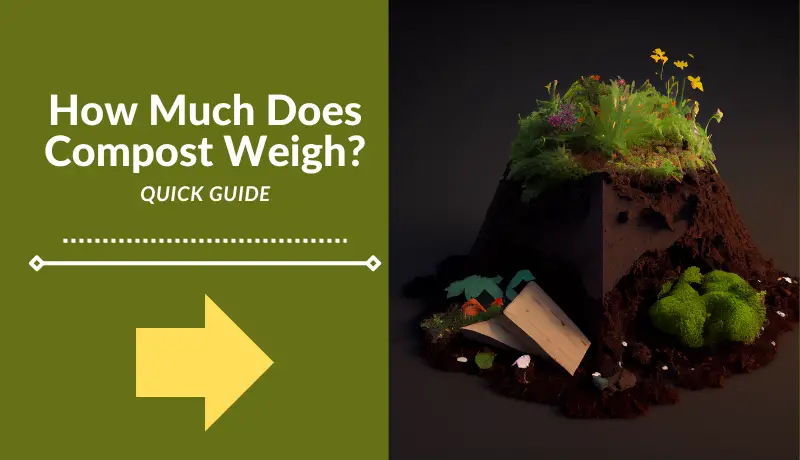Compost weight can be a finicky beast! The weight can vary depending on the type of material being composted and the stage of decomposition it is in. This means that a pile of finished compost may weigh significantly more (or less) than a pile of unfinished material.
We’ll be exploring all aspects of compost weight to give you an understanding of why it varies so much and the proper conversions for purchasing your compost.
So let’s dive in and get to know more about the compost weights!
Compost Weight (Wet vs Dry)
When purchasing compost from a commercial store, you’ll want to be aware of the levels of moisture. If it gets bagged wet or dry will change its weight. This is why most of the time they are sold by volume instead of weight.
This means you’ll always get the same amount no matter the moisture level at the location the compost was harvested.
How Much Does a Yard of Compost Weigh?
Compost weight can vary widely, depending on the type and composition of the material being composted, as well as its stage of decomposition. As a result, a yard of compost may weigh significantly more or less than expected!
Typically, when purchasing compost from a commercial store it will be sold by volume instead of weight due to variations in moisture levels. To get an accurate measurement of the weight of a yard of compost, it is important to take into consideration both the type and amount of material being measured.
When measuring in cubic yards (3′ x 3′ x 3′), one cubic yard will typically weigh anywhere between 900-1600 pounds, depending on whether the material is dry or wet. For example, one cubic yard of soil can usually weigh between 900-1100 pounds when dry and up to 1600 pounds when wet. On the other hand, one cubic yard of composted leaves may only weigh around 800-900 pounds when dry and 1200-1300 pounds when wet.
It’s also important to note that the weight of a cubic yard can vary significantly depending on what kind of material is being used for composting. For instance, one cubic yard of fresh grass clippings is close to 350 pounds whereas one cubic yard of wood chips could range from 1000-1600 pounds!
In general, there are several factors that can affect the weight of a given amount of compost: moisture content, particle size, and density (which varies based on what materials are being combined), as well as how long it has been left to decompose. Taking all these variables into account should give you an accurate estimate of how much your own pile weighs so that you can adjust your management practices accordingly.
How Much Does Wet Compost Weigh?
On average, a cubic yard of wet compost will typically weigh between 1200-1400 pounds
How Many Bags of Compost Are In a Cubic Yard?
Generally speaking, the best approach would be to purchase the compost by volume instead of weight as it will take into account any moisture levels and other factors that could potentially affect its overall weight.
However, one cubic yard is about 15 bags of compost and weighing in around 45 – 50 pounds for a typical bag size of 50 liters
How Much Does 1 Cubic Foot of Compost Weigh?
Typically 1 cubic foot of compost will weigh 40 – 50 pounds
Knowing that there are 27 cubic feet in a cubic yard, you can do some quick maths to figure out the weight. To get the weight of 1 ft 3, simply divide by 27.
How Much Does a Cubic Meter of Compost Weigh?
Typically, one cubic meter of compost weighs 956 lbs or 434 kg.
How much does a 50-liter bag of compost weigh?
Typically, a 50-liter bag of compost will weigh 81 lbs or 36 kg.
How Much Does a 40-Liter Bag of Compost Weigh?
A 40-liter bag of compost will on average weigh about 65 lbs or 29 kg.
How Much Does a 10-Liter Bag of Compost Weigh?
A 10-liter bag of compost will weigh approximately 16 lbs or 7 kg.
Quick Guide to Compost Volume and Weight
| Volume of Compost: | Weight in lbs : | Weight in kg: |
| 1 cubic yard (yd3) | 1250 lbs | 1250 lbs |
| 1 cubic foot (ft3) | 46 lbs | 21 kg |
| 1 cubic meter (1m3) | 956 lbs | 434 kg |
| 50 L bag | 81 lbs | 36 kg |
| 40 L bag | 65 lbs | 29 kg |
| 10 L bag | 16 lbs | 7 kg |
How Much Does a Yard of Compost Cost?
On average, one cubic yard of compost will cost anywhere from $35-$80, with prices varying widely depending on location and composition. If purchasing from online retailers or local garden centers, it’s important to know exactly what type of compost is being sold before making a purchase.
Generally speaking, compost mixes containing higher levels of nutrients such as nitrogen, potassium and phosphorus will be more expensive than those offering only basic organic matter.
Ultimately, when looking for quality compost at an affordable price point one should research all available options thoroughly before making a purchase. Compost is an incredibly versatile soil additive with numerous benefits so investing in high-quality materials is always worth considering!

David, the founder of The Garden Fixer, started with a passion for gardening in 2012. He has continued his passion for gardening and desire to improve his skills and wanted to share his journey and helpful knowledge with other like-minded individuals.
He launched The Garden Fixer as an outlet for those interested in learning more about Gardening in hopes they can take what they learn and apply it for themselves!
